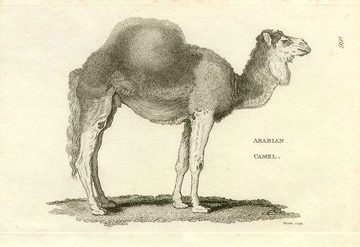
[Illustration: Arabian Camel from George Shaw, Zoology (1801)]
[Tabsir Redux is a reposting of earlier posts on the blog, since memories are fickle and some things deserve a second viewing.]
[Joseph Osgood was a Black American sailor who visited the Yemeni port of Mocha about a dozen years before the start of the American Civil War. He offers a rich, descriptive account of his visit to the Yemeni coast, including a sailor’s view of the ship of the desert.]
No wheel carriages are used here, the most general mode of transportation being by camels, for which the males along are serviceable. The flesh of the camel forms a staple article of food, the head and neck being excepted, because one of the race unwittingly rendered these parts unholy by obtrusively poking his head and neck into Mahomet’s tomb. Wellsted says that a camel is welcomed at its birth, by the Arab, with “another child is born unto us.”
Upon the back of one of these “ships of the desert” I made a trip on a sultry afternoon, through the country to an Arab picnic by Syed Abdallah bin Omar Sahfee, at the county seat of a wealthy Arab merchant, Abdul Rasool. But a word or two preliminary. Having in mind Abdallah’s invitation, I had for two days scorned to engaged one of the tolerable Arabian horses to be had, unwisely keeping an appetite for some better choice, till I found that I must walk or take an ugly and famished camel with a small head, made expressive by little ears and small black bright eyes, and with a neck long enough to have allowed him to feed upon wayside herbage, even at his fastest pace. His body was disappointingly large, like a well distended wind pouch, with a curved back, from the middle of which a single hump rose to an apex ten feet from the ground. His attenuated legs eloquently besought for some kind of pantaloon appendage to hide their disagreeable slimness. Had he been healthy and well fed, his dorsal hump would have been rough and fleshy, but a half starved existence had called upon that curious provision of nature to supply therefrom the chief nourishment of his body, until but little of it remained but the body framework, presenting almost as many corners as a trapezihedron. The preceding unflattering description might have applied to all camels to be met with at Mocha. Having received a signal that his burden was in waiting, his ungainly legs were gathered under him, with his hind quarters towards the wind, as all camels do when left to themselves to take a posture of rest. Mounting the triangular saddle, the sight of which was enough to incapacitate one for sedentary pursuits, I gave the signal for his rise. This he accomplished by a convulsive motion of his fore legs, whereupon his hind legs, which partial nature had provided with two separate joints, the one bending forward and the other backward, were straightened. A third motion of the fore legs, and the animal was upon all fours, ready for traveling. Camels are frequently driven, or rather steered, by means of a string fastened to the tail, its ends behind held by the rider. Instead of this mode, a stick, with reins attached, had been passed through the nostrils of the animal I was riding. he started off unconcernedly with his light load at the rate of five or six miles an hour, over a good road lined on each side for several miles, with date groves, and in less than an hour brought me to the garden of Abdul Rasool, which was appropriated, like several others in the neighborhood, to the culture of a limited number of stinted date trees, herbs and vegetables, at great expense. All the plantations near the city are irrigated with water raised from wells by means of bullocks. Within Abdul Rasool’s garden I found the governor and other worthies apparently enjoying their host’s hospitality in smoking, eating, quaffed coffee, and gossiping with numbers of Arabs, Persians, Suratmen and Turks. But the requisite source of pleasure on such occasions, that of female society, was not there to be found. A strict compliance with religious tenets made it strictly a male assemblage.
Excerpt from Joseph Barlow Felt Osgood, Notes of Travel or Recollections of Majunga, Zanzibar, Muscat, Aden, Mocha, and Other Eastern Ports (Salem: George Creamer, 1854), pp. 189-191.